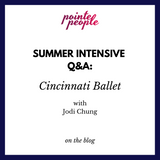Age: 29
Hometown: Los Angeles
Current Company: University of Oxford and London Contemporary Ballet Theatre
Favorite Brands: Bloch
Favorite Roles: New roles (whatever I haven’t done)
What got you into ballet? Was it an immediate love of yours or acquired?
I was bribed by my mom to take my first class when I was 13 years old because she wanted to fix my posture. She only wanted me to take ballet for one year and then quit. However her plan backfired because I fell in love with it. There have been times where I have “retired” and quit ballet throughout the years, but each time I can be found once again back in the studio after just a few months.
Where did you study growing up? Who inspired you most as a young student?
I received a mishmash of training. I trained in Los Angeles and at various summer programs. I’ve trained in Italy with an incredible teacher (I used to fly to Italy every holiday, sleep on her kitchen floor and train with her all day between the age of 16-22). At Harvard, I had incredible opportunities to perform amazing work like Twyla Tharp’s Sinatra Suite, and had the inspiring Heather Watts and Damian Woetzel mentoring and coaching us on Balanchine repertoire.
At what point did you realize that you really loved both ballet and physics?
Probably, freshman year of college as I was studying in the splits and finishing problem sets with my leg up in a door frame.
What were some of the reasons why people told you that you couldn't pursue both ballet and physics?
I think they (the naysayers) did really want the best for me, but they insisted that I could not do both because they had not seen it done before. I had started dance late, did not have proper training, and I had started physics late, and etc etc…
Were you dancing at Boston Ballet while attending Harvard simultaneously?
I took a semester off to dance with Boston Ballet, however I still worked at my lab at Harvard. In between double shows, I would jump in a cab, rush back to Harvard scrubbing off all my makeup, jump into full clean room gear (full body suit, booties, hair mask, face mask, gloves etc), work a couple hours finishing up experiments, then jump back into a cab, throwing makeup back on in time for the second show of the day, and at night I would be back at the lab, and performance again the next morning.

How do you, schedule-wise, do both in a professional ballet company?
When I was at Zurich Ballet, I audited classes at ETH. When at Boston Ballet, I worked on experiments at Harvard. When at English National Ballet and London Contemporary Ballet Theatre I worked on experiments at Oxford. However, I take time off from school officially when I join a company.
What is a challenge that you face as a dancer and how do you manage it?
The hardest part by far (especially when I was juggling a physics degree at Harvard) is committing to hours and hours of training and not knowing if it will pay off. It’s the doubts at the end of the day that are the most challenging to deal with. I still doubt myself all the time, but I realized that I can either let these doubts destroy my dreams or use them to create drive and inspiration. What matters is that you aren’t stopped by those doubts and don’t give up.
What is your favorite healthy dance bag snack?
Snickers. They’ve got protein right ;) ?
Do you cross-train? If so, how?
I’ve got my own stretches that I do, certain gym exercises, and sometimes yoga.
How much do you read in a given day?
It depends if I’m editing my thesis all day! If we’re talking about regular books, I prefer to listen to audio books while I’m commuting or brushing my teeth.
Did you ever feel that your directors or peers treated you differently for not focusing solely on ballet?
At first yes, but I’m very focused on dance when I’m in the studio so that prejudice goes away.

If there's one tip you could give ballet dancers from a physics perspective, what would it be?
I would recommend taking physics. Dance makes a lot more sense and it’s easier to improve when you understand torque, the distribution of your centre of mass, conservation of angular momentum, etc.
As someone who understands physics, what is the most amazing thing about ballet dancers and what they can accomplish that goes against physics and the way the body is built?
Ballet dancers should be proud of everything they’re able to do from jumps, to turns, even just balances.
Besides the obvious, why do you feel that it's important for dancers to have a life and education outside the studio?
I highly recommend that every dancer have a life and education outside of the studio. It is incredibly fulfilling, and I am convinced it makes you a better dancer. Having an additional career/passion keeps things in perspective and makes you really appreciate how wonderful and what a privilege it is to dance. It keeps you hungry to get back into the dance studio and inspires new movement. We all know that the dance world can be a bit crazy sometimes and inevitably we feel judgement, negativity or insecurity, but if you have a second passion or are thinking about cool things you learned in school that day, it gives you that freedom not to care. And when you are not worried or stressed is when you dance best. Also don’t worry about taking time off from dance. I’ve taken a year off and in couple months been back in a company. If you can turn off your doubts, your muscle memory is really smart and will remember a lot more than you think. Also, taking a break allows your injuries to fully heal and lets you dance longer.
Learn more about Merritt:
Keep up with Merritt on her incredible journey: @merrittmoore



